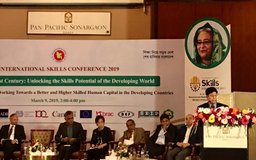Remarks by Dr. A. K. Abdul Momen, M.P. Hon’ble Foreign Minister Government of the People’s Republic of Bangladesh and the Chair of the Technical Session 1: Global Context: Working Towards a Better and Higher Skilled Human Capital in the Developing Countries at the International Skills Conference 2019 - Skills for the 21st Century: Unlocking the Skills Potential of the Developing World

9 March 2019, Hotel Pan Pacific Sonargaon, Dhaka
OPENING REMARKS
Excellencies,
Distinguished delegates
Esteemed panelists and experts joining from around the world
Ladies and Gentlemen,
Good morning.
It is my pleasure to welcome you to the firsttechnical session of the international skills conference 2019. Theme for the session is “Global Context:Working Towards a Better and Higher Skilled Human Capital in the Developing Countries”. As you can see, we are privileged to have an esteemed and qualified panel of participants from home and abroadto talk, discuss and share their experiences at the session.Let me thank you once again for joining with us.
Ladies and gentlemen,
Right at this moment in history, we are witnessing an unprecedented technological and technology-driven human advancements. Therate, scale, and scope of this advancement, also known as the fourth industrial revolution, is yet to be fully analyzed and understood. But, one thing is sure, the first wave of impact will be on our jobs.A number of existing jobs is already on decline and will disappear due to automation, uses of artificial intelligenceand e-business. New jobs – completely new ones – such as Medical Roboticists, simulation engineers, or future forecasterswould surface. Moreover, the exiting jobs that would survive in the future, such as health professionals, managers, analysts etc., would require to be at home with new sets of skills. Thus, a possibility is, in some cases, physical labor oriented comparative advantage of a developing country may suffer if our educated youth is not properly trained and skilled to become job-worthy. The World Economic Forum, in its 2018 flagship report titled “Future of Jobs”, also warns us the same. If their report appears are credible, then as per them, 75 million jobs will be displaced by artificial intelligence (AI), robotics, and automation. However, at the same time, the report also estimates that a possible 133 million new jobs will be created. That means, a net gain, with 4IRis predicted to be almost 60 million jobs, globally.
Under the dynamic leadership of Prime Minister Sheikh Hasina, Bangladesh have been able to achieve commendable success over the past decade and met all the criteria to graduate from LDC and striving to achieve status of upper Middle Income country by 2024 and it also aims to achieve its dream, the Sonar Bangla, a developed, prosperous and stable economy by 2041. In addition, it proposes to achieve all the relevant SDGs by 2030. In order to achieve our roadmaps, our 2011 National Skill Policy, the 2017 National Youth Policy, 7th Five Year Plan, SDG attainment strategies, policies and plans, all are geared to bridge the gap of our existing and future workforce by attaining excellence through skill based education and training.
Bangladesh has two great resources. One is vast manpower and the other is water. However, unless we manage them effectively and correctly, they could be our cause for concern. If we cannot manage our waters and environment correctly, it may wash away our towns and cities and create impediments to achieve our goals. At the same time, if we cannot manage our manpower, it may not be able to receive demographic dividend. We are lucky, at present half of our population, around 49% are below the age of 25 years and 1/3rd is between 18-34 years of age. They are industrious, hardworking and very quick learner. If they are skilled properly, they will certainly be our asset to bring demographic dividend.
As per various estimates, we hardly have any unemployment among those that have no education or less education. Unfortunately, unemployment rate among educated youth is growing fast and therefore, the government in its manifesto put special attention to provide quality education, adequate training and skill development. In order that our children, no one is left behind including disable and autistic, on the 1st day of January each year, government distributes millions of books to all school children, rich and poor and by and large, it stops disruption of academic programs. Nowadys, there is no more hartals and strikes and session jot. More importantly, so that our kids could be competitive in this global world with appropriate technology and skills, it established Sheikh Russell Digital Labs in thousands of schools and it aims at providing Smart Boards to nearly 350,000 schools and colleges across the country. While we have started these initiatives, it is time for us to get better ideas and action program so that we can achieve our desired goals.
I believe the global array of experts present here will provide us a deep understanding of the global scenario of skills development and give a glimpse into the future. The experiences shared by the members of other countries will help us to get a good understanding of the future approaches for the developing countries including Bangladesh. The session will explore ideas of “Global shifts in skills and competency requirements”; “Containing jobless growth and rising unemployment”; “Policy and institutional reforms” and many more which will facilitate a rigorous discussion on the global context of human development.
I would like to introduce the moderator for the session Mr. Syed Nasim Manzur. Mr. Manzur is the Managing Director of Apex Enterprise Ltd. He was also the former president of the Metropolitan Chamber of Commerce and Industry. His role as an employer enables him to not only to understand the skills requirements of the industries, but also the changing demand and job nature in the global market, making him an ideal moderator for the session.
Download








